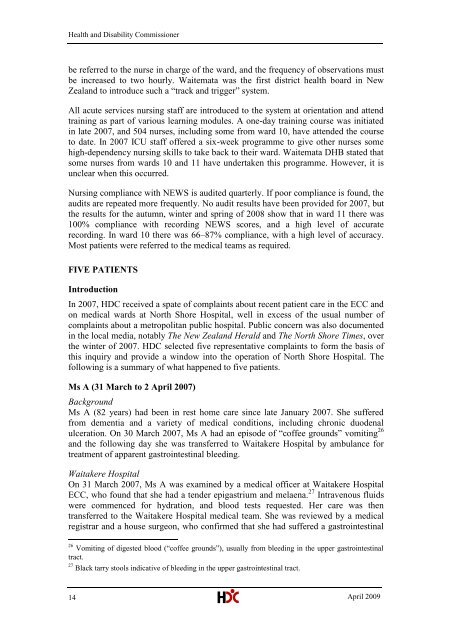North Shore Hospital report - New Zealand Doctor
North Shore Hospital report - New Zealand Doctor
North Shore Hospital report - New Zealand Doctor
You also want an ePaper? Increase the reach of your titles
YUMPU automatically turns print PDFs into web optimized ePapers that Google loves.
Health and Disability Commissionerbe referred to the nurse in charge of the ward, and the frequency of observations mustbe increased to two hourly. Waitemata was the first district health board in <strong>New</strong><strong>Zealand</strong> to introduce such a ―track and trigger‖ system.All acute services nursing staff are introduced to the system at orientation and attendtraining as part of various learning modules. A one-day training course was initiatedin late 2007, and 504 nurses, including some from ward 10, have attended the courseto date. In 2007 ICU staff offered a six-week programme to give other nurses somehigh-dependency nursing skills to take back to their ward. Waitemata DHB stated thatsome nurses from wards 10 and 11 have undertaken this programme. However, it isunclear when this occurred.Nursing compliance with NEWS is audited quarterly. If poor compliance is found, theaudits are repeated more frequently. No audit results have been provided for 2007, butthe results for the autumn, winter and spring of 2008 show that in ward 11 there was100% compliance with recording NEWS scores, and a high level of accuraterecording. In ward 10 there was 66–87% compliance, with a high level of accuracy.Most patients were referred to the medical teams as required.FIVE PATIENTSIntroductionIn 2007, HDC received a spate of complaints about recent patient care in the ECC andon medical wards at <strong>North</strong> <strong>Shore</strong> <strong>Hospital</strong>, well in excess of the usual number ofcomplaints about a metropolitan public hospital. Public concern was also documentedin the local media, notably The <strong>New</strong> <strong>Zealand</strong> Herald and The <strong>North</strong> <strong>Shore</strong> Times, overthe winter of 2007. HDC selected five representative complaints to form the basis ofthis inquiry and provide a window into the operation of <strong>North</strong> <strong>Shore</strong> <strong>Hospital</strong>. Thefollowing is a summary of what happened to five patients.Ms A (31 March to 2 April 2007)BackgroundMs A (82 years) had been in rest home care since late January 2007. She sufferedfrom dementia and a variety of medical conditions, including chronic duodenalulceration. On 30 March 2007, Ms A had an episode of ―coffee grounds‖ vomiting 26and the following day she was transferred to Waitakere <strong>Hospital</strong> by ambulance fortreatment of apparent gastrointestinal bleeding.Waitakere <strong>Hospital</strong>On 31 March 2007, Ms A was examined by a medical officer at Waitakere <strong>Hospital</strong>ECC, who found that she had a tender epigastrium and melaena. 27 Intravenous fluidswere commenced for hydration, and blood tests requested. Her care was thentransferred to the Waitakere <strong>Hospital</strong> medical team. She was reviewed by a medicalregistrar and a house surgeon, who confirmed that she had suffered a gastrointestinal26 Vomiting of digested blood (―coffee grounds‖), usually from bleeding in the upper gastrointestinaltract.27 Black tarry stools indicative of bleeding in the upper gastrointestinal tract.14April 2009
















